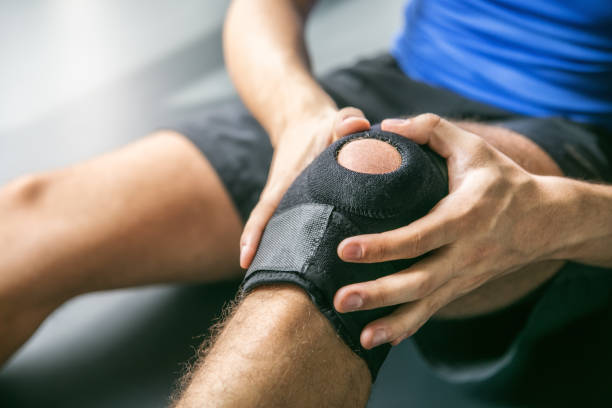Health
Proven Strategies for Knee Protection in Running
Are you an avid runner trying to protect your knees and avoid injury? If so, you have come to the right place. In this article, we will provide helpful advice and tactics for protecting your knees while enjoying your running habit.
Common Knee Injuries in Runners
Running is a great kind of exercise with many health advantages. However, it can also place a lot of strain on your knees, making them prone to injury. Understanding the most prevalent knee problems among runners is the first step toward preventing them.
- Runner’s Knee: Also known as patellofemoral pain syndrome, runner’s knee is a condition characterized by pain around the kneecap. It is often caused by overuse, improper running form, or muscle imbalances.
- IT Band Syndrome: The iliotibial (IT) band runs along the outside of the thigh and can become inflamed due to repetitive motion. IT band syndrome causes pain on the outer side of the knee.
- Patellar Tendonitis: This condition, also known as jumper’s knee, occurs when the tendon connecting the kneecap to the shin becomes inflamed. It is usually caused by repetitive stress or overuse.

Importance of Knee Protection When Running
Whether you’re a seasoned marathoner or a beginner, knee health is critical for maintaining your enjoyment of running. Without proper protection, running’s repetitive impact can cause chronic pain and long-term harm. That’s why it’s critical to consider knee protection in your running regimen.
Protecting your knees not only helps to prevent injuries, but also improves your running performance and lifespan. By following the proper tactics and procedures, you can enjoy pain-free runs and keep your knees healthy for years to come.
Choosing the Right Running Shoes for Knee Protection
Selecting the appropriate running shoes is one of the most important aspects of knee protection. The improper pair of shoes can have a big impact on your knee health and raise the chance of damage. Here are some considerations to consider when choosing running shoes:
- Proper Fit: Make sure your shoes fit comfortably and give adequate support for your arches and ankles. Ill-fitting shoes can cause biomechanical difficulties and increase stress on your knees.
- Cushioning: Look for shoes with enough cushioning to absorb the impact of each step. This reduces the load on your knees and lowers the danger of injury.
- Stability: If you overpronate or have other gait issues, choose shoes that offer stability and motion control. These characteristics can help you improve your foot mechanics and reduce stress on your knees.
Remember, investing in high-quality running shoes that are specifically designed for your foot type and running style is a worthwhile investment in your knee health.

Proper Warm-Up and Stretching Exercises for Knee Strength
Warm-up exercises and stretching routines are vital for preparing your body for running and protecting your knees. By incorporating these practices into your pre-run routine, you can improve flexibility, increase blood flow to the muscles, and reduce the risk of injury. Here are some exercises to consider:
- Dynamic Warm-Up: Start with dynamic warm-up exercises that target your lower body, including leg swings, walking lunges, and high knees. These movements help activate the muscles around your knees and prepare them for the upcoming run.
- Quad and Hamstring Stretches: Stretching your quadriceps and hamstrings is essential for maintaining knee flexibility. Perform standing quad stretches and seated hamstring stretches to elongate these muscles before and after your runs.
- Calf Stretches: Tight calf muscles can contribute to knee pain and discomfort. Incorporate calf stretches into your routine to improve flexibility and alleviate stress on your knees.
Remember to perform each exercise with proper form and gradually increase the intensity as your muscles warm up. A proper warm-up and stretching routine can go a long way in protecting your knees during running activities.
Correct Running Form and Technique for Knee Preservation
Running with correct form not only improves your overall performance but also helps protect your knees from unnecessary strain. Here are some key tips to ensure proper running form:
- Posture: Maintain an upright posture, with your head and shoulders aligned. Avoid slouching or leaning too much forward, as this might increase the strain on your knees.
- Footstrike: Strike with your midfoot or forefoot, not your heel. Landing on your midfoot rather than your heel helps absorb shock and lowers pressure on your knees.
- Cadence: Increase your cadence, or the number of steps per minute, to lessen the strain on your knees. Higher cadence encourages shorter, faster strides, reducing joint stress.
Additionally, consider working with a running coach or physical therapist to help you assess and improve your running form. They can provide personalized guidance and help you make necessary adjustments to protect your knees.

Cross-Training Activities to Support Knee Health
Incorporating cross-training activities into your fitness routine can help strengthen the muscles around your knees and improve overall knee stability. Here are some low-impact exercises that can support knee health:
- Cycling: Cycling is a low-impact cardiovascular exercise that helps build strength in your quadriceps and hamstrings. It is an excellent cross-training activity that can supplement your running routine while minimizing stress on your knees.
- Swimming: Swimming is a full-body workout that provides cardiovascular benefits without putting pressure on your joints. It helps improve muscle tone and flexibility, making it an ideal activity for knee support.
- Strength Training: Incorporate strength training exercises that target the muscles around your knees, such as squats, lunges, and leg presses. Strengthening these muscles can help stabilize your knee joint and prevent injuries.
Remember to vary your workouts and listen to your body. By diversifying your exercise routine, you can reduce the risk of overuse injuries and promote overall knee health.
Utilizing Knee Braces and Supports During Running
Knee braces and supports can provide additional stability and protection for your knees while running. These tools are especially beneficial if you have a history of knee injuries or are recovering from a knee-related condition. Here are some options to consider:
- Compression Sleeves: Compression sleeves offer modest compression and support for the knee joint. They can assist minimize swelling, increase blood flow, and give stability during jogging.
- Patellar Straps: Patellar straps are intended to relieve pain caused by conditions such as runner’s knee and patellar tendinitis. They use targeted pressure on the patellar tendon to relieve stress and improve knee function.
- Knee Braces: Knee braces provide increased support and stability for people with moderate to severe knee instability. They are frequently prescribed for those who are recuperating from injuries or treating persistent knee issues.
Before using any knee brace or support, consult with a healthcare professional or physical therapist to ensure you select the right option for your specific needs. They can help you determine the appropriate level of support and guide you in using these tools effectively.

Nutrition and Supplements for Joint Health
Maintaining a balanced diet and incorporating joint-healthy nutrients can support the health and longevity of your knees. Here are some essential nutrients and supplements to consider:
- Omega-3 Fatty Acids: Found in fatty fish, walnuts, and flaxseeds, omega-3 fatty acids have anti-inflammatory properties that can help reduce joint pain and inflammation.
- Vitamin C: Citrus fruits, strawberries, and bell peppers are rich in vitamin C, which plays a crucial role in collagen synthesis and cartilage health.
- Glucosamine and Chondroitin: These supplements are commonly used to support joint health and reduce the symptoms of osteoarthritis. They can help alleviate knee pain and promote cartilage repair.
A well-rounded diet, consisting of fruits, vegetables, lean proteins, and whole grains, can provide the necessary nutrients for optimal joint health. Additionally, consult with a healthcare professional before starting any dietary supplements to ensure they are suitable for your individual needs.
Rest and Recovery for Knee Injury Prevention
Rest and recovery are essential components of any training program, as they allow your body to repair and strengthen itself. Proper rest and recovery practices can help prevent knee injuries and promote overall knee health. Here are some tips:
- Listen to Your Body: Pay attention to any signs of pain or discomfort in your knees. If you experience persistent pain, reduce your running volume or take a break to allow your knees to rest and recover.
- Cross-Training: Incorporate rest days or low-impact activities into your training schedule. This allows your knees to recover from the repetitive impact of running while still maintaining your fitness level.
- Recovery Techniques: Utilize recovery techniques such as foam rolling, stretching, and ice baths to reduce inflammation and promote muscle recovery.
Remember, rest is just as important as training when it comes to protecting your knees and preventing overuse injuries. Listen to your body’s signals and prioritize recovery to ensure long-term running success.
Conclusion
Protecting your knees is essential for sustaining a pain-free jogging practice and achieving long-term success. You may protect your knees and reduce your chance of injury by following the advice and procedures outlined in this article.
Remember to wear the right running shoes, warm up and stretch properly, run with proper form, and add cross-training activities into your program. Consider using knee braces and supports as needed, and prioritize nutrition and supplements that promote joint health. Finally, do not underestimate the role of rest and recovery in injury prevention.
With these methods in place, you can safeguard your knees, run confidently, and follow your running passion for many years to come. Strong knees contribute to strong runs, so lace up your shoes, care for your knees, and hit the road with confidence!
Trusted Health, Wellness, and Medical advice for your well-being


